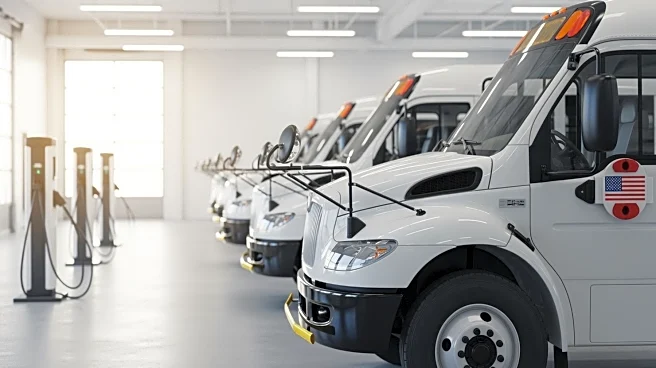What's Happening?
Highland Electric Fleets is advancing its efforts to electrify school bus fleets across the United States, despite recent changes in federal electric vehicle policies. The company, which specializes in Electrification-as-a-Service
(EaaS), is not a manufacturer but provides comprehensive support for school districts transitioning to electric buses. Recently, Highland marked a milestone with the introduction of electric school buses in Hingham Public Schools, Massachusetts. This project, involving three buses, is expected to save the district between $10,000 and $20,000 annually while providing quieter and cleaner transportation for students. The initiative is supported by funding from the Massachusetts Clean Energy Center and the EPA's Clean School Bus Program. Highland is also involved in a significant project for the 2028 Olympic and Paralympic Games in Los Angeles, where it will manage 500 electric school buses.
Why It's Important?
The shift to electric school buses is significant for several reasons. Firstly, it addresses public health concerns by reducing children's exposure to diesel exhaust, which is known to have adverse health effects, particularly on developing lungs. Economically, while electric buses have higher upfront costs, they offer long-term savings through reduced fuel and maintenance expenses. Additionally, electric buses can contribute to grid stability through vehicle-to-grid (V2G) programs, providing energy back to the grid during peak demand times. This not only supports the energy infrastructure but also offers potential financial benefits to school districts. The ongoing transition, supported by state and federal funding, highlights a broader commitment to sustainable transportation solutions.
What's Next?
As federal funding for electric vehicle initiatives faces uncertainty, the future of electric school bus projects may depend more heavily on state-level support and private sector innovation. Highland Electric Fleets is exploring the potential of V2G programs to enhance the economic viability of electric buses. The company is involved in a Department of Energy-funded program to demonstrate the benefits of V2G integration. This initiative aims to create a standardized model for future projects, potentially influencing policy and investment decisions. Meanwhile, states like Michigan are stepping up with their own funding programs to continue the momentum of school bus electrification.
Beyond the Headlines
The transition to electric school buses also reflects broader cultural and ethical shifts towards environmental responsibility and sustainability in public policy. As communities become more aware of the environmental and health impacts of diesel emissions, there is increasing pressure on policymakers and educational institutions to adopt cleaner technologies. This movement could lead to long-term changes in how public transportation is perceived and implemented, potentially influencing other sectors to follow suit.










